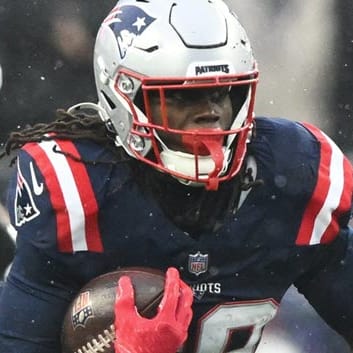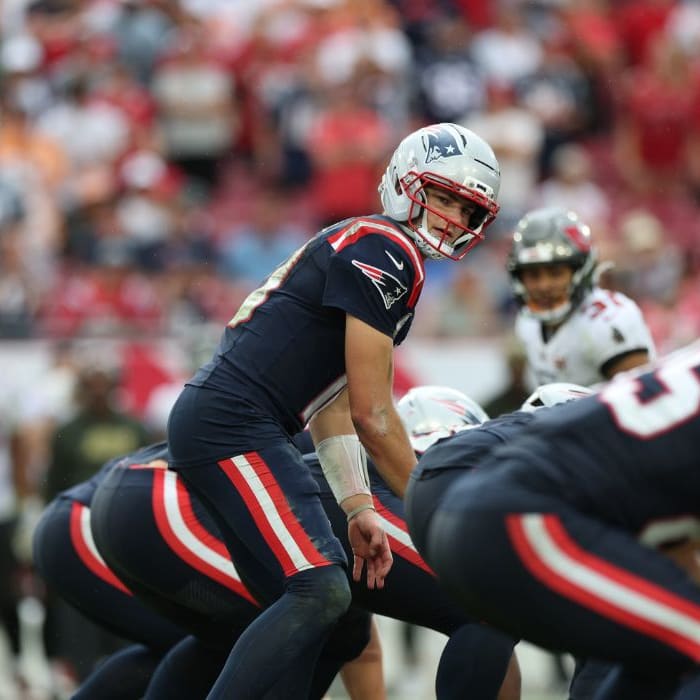This Job Battles series fill finally look at the Wide Receivers. You can view the past articles about quarterbacks here, the tight ends here, and the five editions of the RB battles (in order) here, here, here, here, and here.
The Wide Receiver series will be in multiple installments like the running backs. This first one will look at Arizona, Baltimore and Buffalo.
The competitions are listed alphabetically for team location, and the players are listed in order of years in the NFL. A general verdict is issued at the end of each blurb.
Zay Jones vs. Greg Dortch, ARI
Marvin Harrison and Michael Wilson are locked in as WR1 and WR2. Of course, Trey McBride figures to be more active as a receiver than most tight ends, so we might imagine the pass-catching rotation as Harrison first, McBride second, and Wilson third. What's left after those three probably won't be much, but Wilson has an extensive injury history and the third wideout spot in Arizona might need to play more than most. The candidates for that spot on the depth chart appear to be Dortch and Jones. Chris Moore is also hanging around, but the 31-year-old retread is likely to function as a WR5 and special teams regular.
If it comes down to Dortch and Jones then the one who comes out ahead will likely be determined by the personnel playcalling of the Cardinals offense. That's because Dortch (5-foot-7, 173 pounds)
This Job Battles series fill finally look at the Wide Receivers. You can view the past articles about quarterbacks here, the tight ends here, and the five editions of the RB battles (in order) here, here, here, here, and here.
The Wide Receiver series will be in multiple installments like the running backs. This first one will look at Arizona, Baltimore and Buffalo.
The competitions are listed alphabetically for team location, and the players are listed in order of years in the NFL. A general verdict is issued at the end of each blurb.
Zay Jones vs. Greg Dortch, ARI
Marvin Harrison and Michael Wilson are locked in as WR1 and WR2. Of course, Trey McBride figures to be more active as a receiver than most tight ends, so we might imagine the pass-catching rotation as Harrison first, McBride second, and Wilson third. What's left after those three probably won't be much, but Wilson has an extensive injury history and the third wideout spot in Arizona might need to play more than most. The candidates for that spot on the depth chart appear to be Dortch and Jones. Chris Moore is also hanging around, but the 31-year-old retread is likely to function as a WR5 and special teams regular.
If it comes down to Dortch and Jones then the one who comes out ahead will likely be determined by the personnel playcalling of the Cardinals offense. That's because Dortch (5-foot-7, 173 pounds) can only play the slot whereas Jones is more specifically a boundary receiver. In other words, if the third wide receiver rep for the Cardinals is incidentally in the slot, then it's Dortch and it's not a question. If that third rep is on the boundary, then it's likely Jones.
There are a few ways it could play out, especially since the Cardinals have varied tight end personnel. The Cardinals have the option of running a lot of true two-tight end formations between McBride and blocking specialist Tip Reiman, and in such cases the Dortch versus Jones question becomes moot, because there will only be two wideout reps and they'll be taken by Harrison and Wilson. The Cardinals could theoretically get Dortch some slot snaps as the inside receiver in a lopsided two-tight end formation, where the two receivers are on one side and the two tight ends inline on the other, but that would be pretty much the only time Dortch could see a rep if both McBride and Reiman are on the field. Just the same, if Wilson is missing time then the vacated rep will generally be on the boundary, meaning Dortch will be unlikely to claim it. Jones is unlikely to produce with that replacement rep, but it would likely be Jones or even Moore before Dortch.
Verdict: Between Jones, Moore and Dortch it's only Dortch who projects as a vaguely viable target, but Dortch can likely only earn reps from the slot. Given that the injury-challenged Wilson is a boundary receiver, this means Dortch would be mostly ineligible to replace Wilson even though Jones or/and Moore are unlikely to produce with Wilson's vacated rep. Arizona's tight end depth presses the margins tighter yet – Reiman can free up McBride to move to the slot, and Elijah Higgins can play the slot – so it's unlikely that Dortch or Jones does anything in 2024 without multiple injuries to the players ahead of them.
Nelson Agholor vs. Rashod Bateman vs. Devontez Walker, BAL
Bateman struggled in 2023, looking out of rhythm much of the time and dropping too many of the few targets he was able to draw, but the hope is that those struggles were mostly due to the ongoing foot issues that limited Bateman at various points of camp and the regular season. The line out of Baltimore at this point is that the foot is doing better than it has since Bateman's 2022 Lisfranc injury, so if that's true and if the foot was also the explanation for the prior struggles then it would make sense if Bateman showed improved form in 2024.
Agholor claimed 618 snaps compared to Bateman's 665, poaching most of the short-range targets that Zay Flowers hadn't already. If Agholor and Bateman continue to rotate in this fashion then it won't matter much even if Bateman is improved – 665 snaps isn't enough to draw a viable target count in most formats, especially if Bateman (14.1 ADOT) gets stuck with all the downfield routes while Agholor (8.8 ADOT) gets all of the comparatively easy underneath targets. Hopefully Bateman's improved foot is demonstrated specifically by taking those snaps and targets from Agholor. Bateman will never be a great downfield threat, but he can be good underneath and might be able to reestablish his fantasy value if he can steal something like 25 of the targets Agholor claimed last year.
The new and novel variable is Walker, Baltimore's fourth-round pick out of North Carolina (113th overall). None of Flowers, Bateman or Agholor is a downfield target by nature, but Walker has the frame (6-foot-2, 193 pounds) and speed (4.36-second 40) to threaten far downfield from the sideline. The criticism of Walker as a prospect is basically that he's somewhat one dimensional – a big fast guy who can run past people slower than him and reach higher than people shorter than him, but maybe not an especially consistent threat underneath or in the intermediate. For the Ravens that's fine – they don't have any room for more intermediate runners, anyway – but Walker's downfield range is very much something the Ravens could use but the other three can't offer.
With that said, if Walker emerges as a noteworthy downfield threat for Baltimore then it would have to be at the expense of at least one of Bateman or Agholor. That pie was already small given the target demands of Flowers, Mark Andrews and Isaiah Likely, and it's possible that the three wideouts will split it based on the nature of the task – Walker getting the downfield targets, with Bateman and Agholor splitting the intermediate and underneath.
Verdict: Bateman has a shot to emerge as a viable fantasy wideout in 2024, but he needs to take snaps and especially needs to take underneath targets away from Agholor. Bateman also needs to plan on losing some downfield routes/targets to Walker, but given Bateman's ineffectiveness in that regard in 2023 it might not matter as long as Bateman meets that first condition of pushing aside Agholor. Whether Bateman can do so is an unsettled question. If Bateman can't emerge as a useful fantasy wideout then the next-best chance might be Walker, but Walker would likely be dependent on big plays in a way that doesn't scale up easily.
Curtis Samuel vs. Khalil Shakir vs. Keon Coleman, BUF
All three of these wideouts should play leading roles for the Buffalo offense in 2024, to the point that they all might play similar snap counts. With Stefon Diggs and even Gabe Davis no longer around, the Buffalo wideout rotation appears more horizontally-distributed than in recent years. It should mean that all of Samuel, Shakir and Coleman are some version of valuable this year, but distinguishing first from third might not be so easy.
One thing that seems close to certain is that the rookie second-round pick Coleman should mostly line up on the boundary. Samuel has mostly functioned as a low-ADOT slot receiver since 2020 – a role that suits him given his background as a former running back. If a team is looking for YAC potential in the slot then Samuel is one of the first names that would pop up. It therefore seems likely that Shakir will function something like a flanker when Samuel is in the slot, but Shakir saw most of his own playing time in the slot last year.
Both Samuel and Shakir have the speed to threaten from the boundary, so perhaps they'll both be interchangeable between the slot and the flanker position, to the point that both are on the field even when the Bills might go two-tight end. The Bills will go two-TE often, because they're banking on Dalton Kincaid as their leading target in 2024 even as Dawson Knox is one of the league's most well-paid tight ends. When the Bills go two-TE it will generally be in the form of Kincaid lining up in the slot. Whoever manages to stay on the field at the two boundary reps in those cases has a good chance to emerge as the Bills' WR1, though it would also mean that the one left out would likely be left in clear third.
As much as it would make projections easier if we knew for sure who would be on the field at receiver when the Bills go two-TE, even that filter might be subject to situational variables. For instance, maybe the Bills make Coleman a 'starter' in the red zone by putting Shakir on the bench, but maybe if the Bills are on their own 20-yard line they'd give the rep to Shakir given his superior speed (4.43 versus 4.61). Coleman is by far the biggest of the three receivers – both Samuel and especially Shakir are a bit thinner than the ideal – and Coleman's jump-ball ability was a specific selling point in his prospect pitch. It would make sense if the Bills prioritized Coleman's targets the closer they get to the end zone, though just the same Coleman's lack of speed might make him less interesting to Joe Brady when the Bills could use a big play from scrimmage.
Verdict: Expect Samuel to be the primary slot receiver, but Shakir will also get slot reps while he and Samuel otherwise split most flanker reps in three-wide formations. Given that the Bills will often play two tight ends with Dalton Kincaid and Dawson Knox, however, one of the three receivers might be liable to see their playing time lag when the Bills go two-TE extensively. Samuel is the highest paid and Coleman will likely specialize as a boundary receiver, so if there's no slot rep available it would be reasonable if Shakir were often left out. With that said, Shakir and his 4.43 speed might be the Bills' preferred second boundary rep when they need to cover more yardage quickly. Coleman is the one best prepared to function like a red-zone specialist, meanwhile.






































